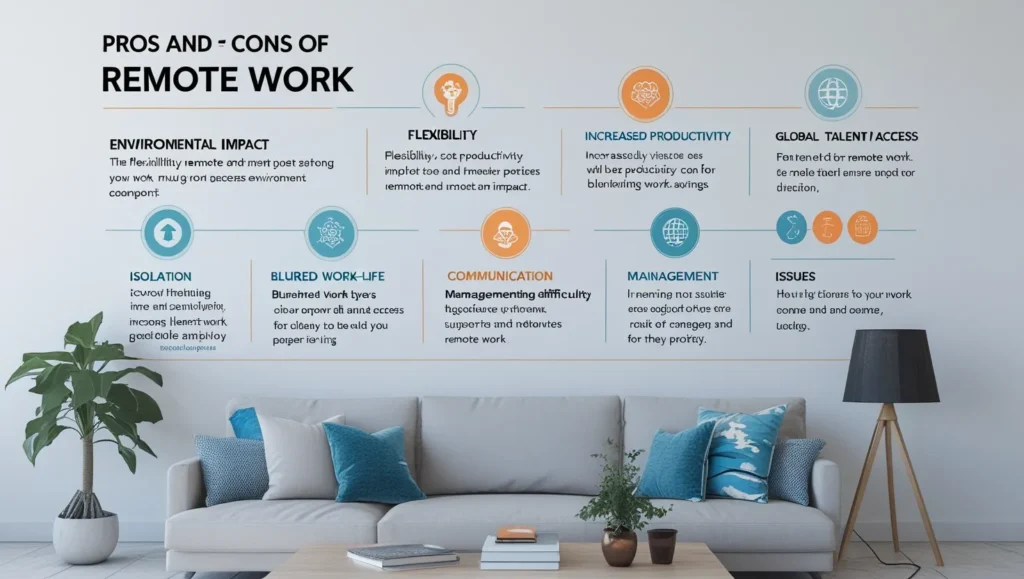Pros and Cons of Remote Work in Nowadays
Remote work has gone from a niche perk to a mainstream way of life. Sparked by the pandemic and accelerated by technology, millions of people worldwide are now working from home, coffee shops, co-working spaces, or even while traveling. Companies have adapted too, setting up virtual offices and embracing hybrid work models. While remote work offers undeniable benefits, it also comes with its unique set of challenges. Let’s dive deep into the pros and cons of remote work in today’s world.
The Pros of Remote Work
1. Flexibility and Work-Life Balance
One of the greatest advantages of remote work is flexibility. Employees can choose their work hours (if the role allows) and structure their day in a way that suits their personal life. Whether it’s picking up kids from school, attending a midday yoga class, or working during peak personal productivity hours, remote work offers unprecedented freedom. This flexibility often leads to better work-life balance, less burnout, and improved overall well-being.
2. Time and Cost Savings
Commuting can be stressful, time-consuming, and expensive. Remote work eliminates daily travel, allowing people to save valuable hours and money on transportation, gas, meals, and even wardrobe costs. Those extra hours can be Pros and Cons of Remote Work in Nowadays reinvested into work, hobbies, family, or personal growth. For companies, it also means reduced expenses on office space, utilities, and other overheads.
3. Access to a Global Talent Pool
Businesses are no longer restricted to hiring locally. Remote work opens doors to a global talent pool, meaning companies can find the best person for the job Pros and Cons of Remote Work in Nowadays regardless of geographical barriers. For employees, this expands job opportunities, letting them work for companies they might never have been able to join otherwise.
4. Increased Productivity
Many remote workers report being more productive at home than in a traditional office setting. Fewer distractions, less time spent in meetings, and the ability to create a personalized workspace all contribute to higher efficiency. Some companies have even seen a spike in performance metrics after shifting to remote models.
5. Better Health and Wellness
Remote work offers people more control over their environment, which can positively impact physical and mental health. Employees can integrate movement, healthy meals, and sufficient rest into their day more easily. Additionally, reduced exposure to illnesses, stress from commuting, and office politics contribute to a healthier lifestyle.
The Cons of Remote Work
1. Feelings of Isolation and Loneliness
While working from home has its perks, it can also be isolating. Employees miss out on face-to-face interactions, casual office chats, team lunches, and social events that are important for human connection. Over time, this isolation can lead to feelings of loneliness, disengagement, and even depression.
2. Communication Challenges
Remote work relies heavily on digital communication tools like Zoom, Slack, or Microsoft Teams. Despite the convenience, virtual communication can sometimes lead to misunderstandings, misinterpretations, and a lack of personal touch. Time zone differences can further complicate collaboration, making meetings difficult to schedule and slowing down project progress.
3. Blurred Boundaries Between Work and Home Life
One of remote work’s greatest strengths can also be a major weakness. Without the clear boundary of a physical office, many people find it hard to “switch off” from work. Emails, messages, and projects can spill into evenings and weekends, leading to overwork and burnout. Some employees report feeling like they’re “always on,” which ultimately hurts their productivity and mental health.
4. Risk of Reduced Career Growth
Remote employees may sometimes be overlooked for promotions, leadership opportunities, or key projects compared to in-office colleagues. “Out of sight, out of mind” can be a real issue if managers aren’t intentional about including remote workers in major conversations and decisions. Moreover, missing out on Pros and Cons of Remote Work in Nowadays spontaneous brainstorming sessions or hallway conversations can impact professional growth.
5. Security and Tech Issues
Remote work depends heavily on technology and stable internet connections. Any disruptions can halt productivity. More importantly, working outside a secured office network increases the risk of data breaches, cyberattacks, and privacy issues. Companies need to invest significantly in cybersecurity training, VPNs, and secure software tools to protect sensitive information.
Striking the Right Balance
The future of work is likely to be a hybrid model, combining the best of both remote and in-person setups. Companies are realizing that offering flexibility while maintaining regular touchpoints for collaboration, brainstorming, and team building creates a more sustainable work environment.
For remote workers, setting up clear routines, maintaining a dedicated workspace, scheduling regular social interactions, and establishing firm work-life boundaries are key strategies to thrive. Companies, on the other hand, need to foster transparent communication, ensure career progression opportunities for remote staff, and invest in technology and wellness programs.
Final Thoughts
Remote work is neither a magic solution nor a passing trend—it’s a new reality. Its advantages are life-changing for many, offering freedom, savings, and improved well-being. But it also demands careful navigation of its downsides, such as isolation and blurred work-life boundaries. By embracing the strengths of remote work while Pros and Cons of Remote Work in Nowadays addressing its challenges thoughtfully, individuals and organizations can build a future of work that is both productive and fulfilling.

